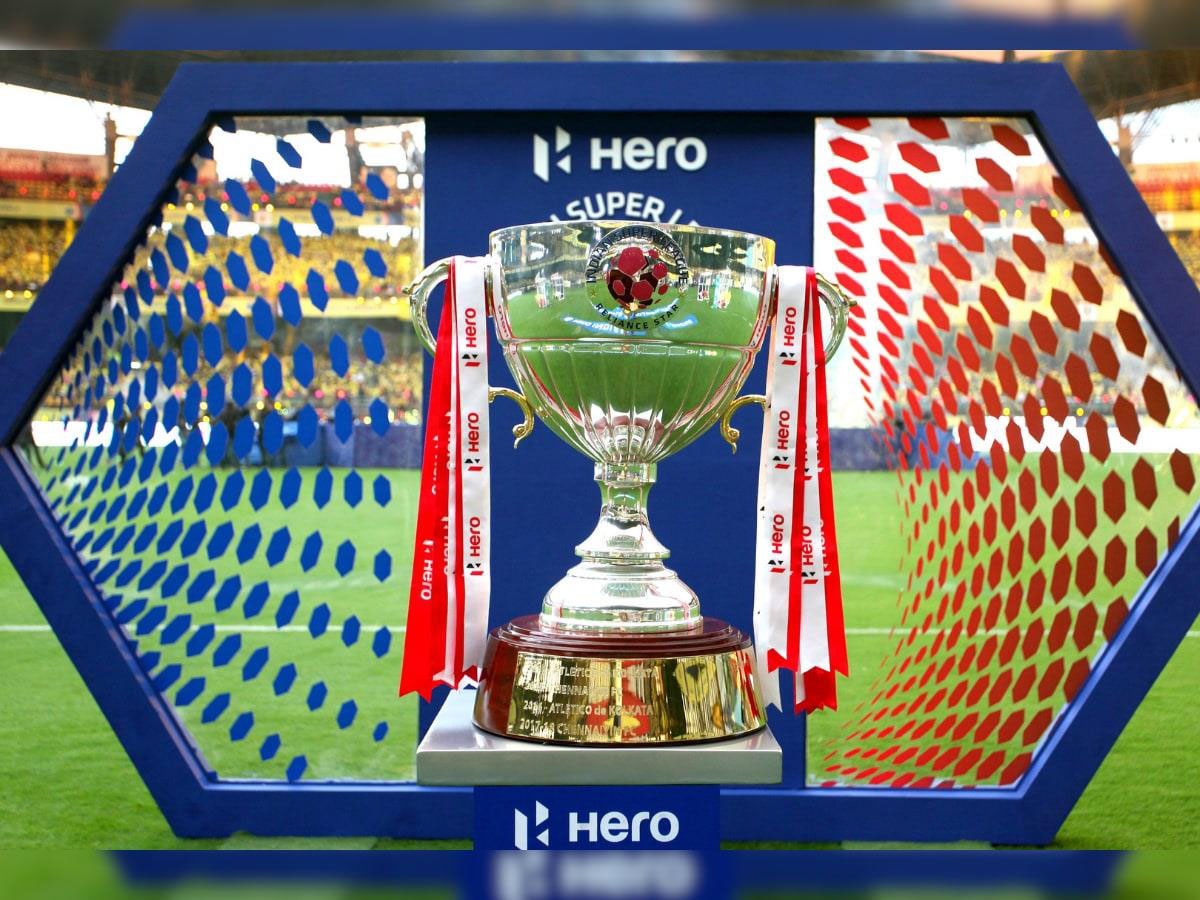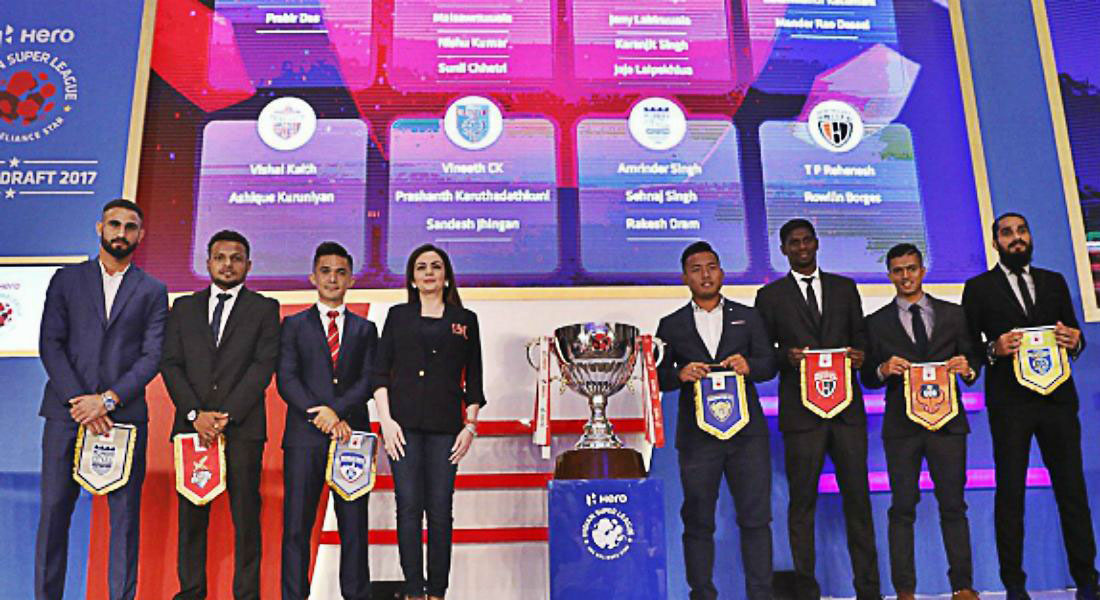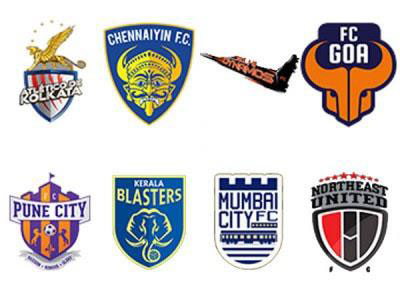
The Indian Super League (ISL) is a men's professional football league, which is the highest level league in Indian football system. It is organised by All India Football Federation and their commercial partners Football Sports Development Limited. For sponsorship ties with Hero MotoCorp, it is officially called Hero Indian Super League.
The league currently comprises 11 clubs. Each season of the tournament generally runs from November to March. During the league stage of the competition, each club plays against all the other clubs in a round-robin style. At the end of the league stage, the team with the most points gets declared the Premiers and presented with a trophy named League Winners Shield, and the top four clubs qualify for the play-offs. The season then culminates with the ISL Final to determine the Champions who are presented with the ISL Trophy.
The competition was founded on 21 October 2013 with the aim of growing the sport of football in India and increasing its exposure in the country. The league began in October 2014 with eight teams. During its first three seasons, the competition operated without official recognition from the Asian Football Confederation (AFC), the governing body for the sport in Asia. The competition was also structured along the same lines as the Indian Premier League, the country's premier Twenty20 franchise-based cricket competition. Each season lasted just 3 months, from October to December, and matches were held daily. However, before the 2017–18 season, the league expanded to ten teams, expanded its schedule to six months, and earned recognition from the AFC.
The league winners participates directly in the AFC Champions League and the ISL Final winner participates in the AFC Cup qualifying-playoffs.
Since the league's inaugural season, a total of four clubs have been crowned as the Champions: ATK , Chinnaiyan , Bengaluru and Mumbai City . Since it's introduction in 2019–20 season, both Goa and Mumbai City won the League Winners Shield once.
Football in India has existed in many forms since the game first arrived in the country during the 19th century with the first nationwide club competition, the Durand Cup, beginning in 1888. Despite India's early history in the game, the country's first nationwide football league did not begin until the semi-professional National Football League commenced in 1996. Before the creation of the National Football League, most clubs played in state leagues or select nationwide tournaments.
In 2006, the All-India Football Federation, the governing body for the sport in India, reformatted the league as the I-League in an effort to professionalise the game. However, during the following seasons, the league suffered from a lack of popularity due to poor marketing.
In September 2006, 22 December, the AIFF signed a 10-year television and media contract with Zee Sports. The deal would see Zee Broadcast the National Football League, the I-League, and other tournaments organised by the AIFF and select India international matches. However, in October 2010, the deal between the AIFF and Zee Sports was terminated early after differences between both parties related to payment and how to grow the game in India.
On 9 December 2010, it was announced that the AIFF had signed a new 15-year, 700–crore deal with Reliance Industries and the International Management Group
Foundations
The Indian Super League was officially launched on 21 October 2013 by IMG–Reliance, Star Sports, and the All-India Football Federation. The competition was announced to take place from January 2014 to March 2014, but was postponed shortly thereafter to September 2014.

At first, it was announced that bidding for the eight Indian Super League teams would be complete before the end of 2013 and that there was already high interest from big corporations, Indian Premier League teams, Bollywood stars, and other consortium. However, due to the rescheduling of the league, the bidding was moved to 3 March 2014.It was also revealed around this time that not only would bidders need to comply with a financial requirement but they would also need to promote 'grassroots' development plans for football within their area. Finally, in early April 2014, the winning bidders were announced. The selected cities/state were Bangalore, Delhi, Goa, Guwahati, Kochi, Kolkata, Mumbai, and Pune. Former India cricket player Sachin Tendulkar, along with PVP Ventures, won the bidding for the Kochi franchise. Another former Indian cricket player, Sourav Ganguly, along with a group of Indian businessmen and La Liga side Atlético Madrid, won the bid for the Kolkata franchise. Meanwhile, Bollywood stars John Abraham, Ranbir Kapoor, and Salman Khan won the bid for the Guwahati, Mumbai, and Pune franchises respectively. Bangalore and Delhi were won by companies while Goa was won by a partnership between Videocon, Dattaraj Salgaocar, and I-League side Dempo.
The first team to be launched officially was the Kolkata franchise as Atlético de Kolkata on 7 May 2014. On 7 July 2014, the team announced the first head coach in league history, Antonio López Habas. The next day, Kolkata also announced the first official marquee signing in the Indian Super League, UEFA Champions League winner Luis García.
Eventually, all eight teams were revealed as Atlético de Kolkata, Bangalore Titans, Delhi Dynamos, FC Goa, Kerala Blasters, Mumbai City, North East United and Pune City. However, on 21 August 2014, it was announced that due to Bangalore's owners dropping out, Chennai would be given a franchise instead. The team was eventually named Chinnaiyan FC.At the same time, the original marquee players were Luis García, Elano, Alessandro Del Piero, Robert Pires, David James, Freddie Ljungberg, Joan Capdevila, and David Trezeguet.
The inaugural season began on 12 October 2014 at the Salt Lake Stadium when Atlético de Kolkata defeated Mumbai City, 3–0. The first goal was scored by Fikru Teferra. The first Indian to score in the league was Balwant Singh for Chinnaiyan FC. The inaugural final was held on 20 December 2014 with Atlético de Kolkata becoming champions after defeating Kerala Blasters 1–0 at the DY Patil Stadium.
All-time Indian Super League table
The all-time Indian Super League table is a cumulative record of all match results, points and goals of every team that has played in the Indian Super League since its inception in 2013. The table that follows is accurate as of the end of the 2020–21 season. Teams in bold are part of the 2021–22 Indian Super League. Numbers in bold are the record (highest either positive or negative) numbers in each column.
Note: Playoff matches taken into account.
| Pos. | Club | Seasons | Pld | Win | Draw | Loss | GF | GA | GD | Pts | 1st | 2nd | 3rd | 4th | Debut | Last App. | Best Pos. |
|---|---|---|---|---|---|---|---|---|---|---|---|---|---|---|---|---|---|
| 1 | Goa | 7 | 130 | 58 | 35 | 37 | 238 | 170 | +68 | 209 | 2 | 2 | 1 | 1 | 2014 | 2020–21 | 1 |
| 2 | Mumbai City FC | 7 | 123 | 51 | 30 | 42 | 162 | 163 | −1 | 183 | 2 | 1 | 2014 | 2020–21 | 1 | ||
| 3 | Chennaiyin | 7 | 127 | 44 | 37 | 46 | 183 | 179 | +4 | 169 | 1 | 1 | 1 | 1 | 2014 | 2020–21 | 1 |
| 4 | ATK | 6 | 107 | 40 | 35 | 32 | 138 | 122 | +16 | 155 | 2 | 1 | 1 | 2014 | 2019–20 | 2 | |
| 5 | NorthEast United | 7 | 120 | 35 | 39 | 46 | 128 | 157 | −29 | 144 | 1 | 1 | 2014 | 2020–21 | 3 | ||
| 6 | Odisha | 7 | 120 | 35 | 36 | 49 | 167 | 195 | −28 | 141 | 1 | 1 | 2014 | 2020–21 | 3 | ||
| 7 | Bengaluru | 4 | 82 | 40 | 19 | 23 | 124 | 88 | +36 | 139 | 2 | 1 | 2017-11 | 2020–21 | 1 | ||
| 8 | Kerala Blasters | 7 | 122 | 31 | 44 | 47 | 141 | 178 | −37 | 137 | 1 | 1 | 2014 | 2020–21 | 2 | ||
| 9 | Pune City | 5 | 80 | 27 | 19 | 34 | 97 | 110 | −13 | 100 | 1 | 2014 | 2018–19 | 4 | |||
| 10 | Jamshedpur | 4 | 74 | 24 | 26 | 24 | 88 | 96 | −8 | 98 | 2017-18 | 2020–21 | 5 | ||||
| 11 | ATK Mohun Bagan | 1 | 23 | 13 | 5 | 5 | 32 | 19 | +13 | 44 | 1 | 2020-21 | 2020–21 | 2 | |||
| 12 | Hyderabad | 2 | 38 | 8 | 15 | 15 | 48 | 58 | −10 | 39 | 2019-20 | 2020–21 | 5 | ||||
| 8 | East Bengal | 1 | 20 | 3 | 8 | 9 | 22 | 33 | −11 | 17 | 2020–21 | 2020–21 | 9 |
| Active clubs in the league | |
| Defunct clubs |
Clubs are paying more to the league than receiving from it
| North East United FC revenues: Rs 20.9 crore | |
| Revenues (Rs cr) | |
| Central revenues from FSDL | 9.8 |
| Sponsorship | 6.8 |
| Ticket revenues | 1.2 |
| Other revenues | 3.1 |
| North East United FC expenditure: Rs 30.8 crore | |
| Expenditure (Rs cr) | |
| Participation fees to FSDL | 12.0 |
| Player/coach remuneration | 8.7 |
| Stadium cost | 1.7 |
| Other expenses | 8.4 |
Conclusion
As mentioned above, the league is co-promoted by Reliance, Star India and supported by the All-India Football Federation (AIFF). India’s leading industrialists and celebrities from sports as well as the Indian film industry have heavily invested in the league’s 11 franchises based in the following cities: Chennai, Bhubaneswar, Goa, Guwahati, Kochi, Kolkata, Mumbai, Hyderabad, Bengaluru and Jamshedpur. The league is committed to investing in stadium refurbishment in the ten identified venues and also to a strong grassroots development programme that will create a platform to groom football talent in the country. With a mission to revolutionise the sport, the Hero ISL is positioned as a high quality and dynamic league that will elevate Indian football to an international level and their objectives are-
To present an international-quality domestic football competition
To engage hundreds of millions of passionate and proud Indian football fans
To encourage and facilitate the masses to start playing the sport
To produce a large pool of talented Indian players and ‘heroes’ to play for the Indian national team
To set new standards in sports administration, governance and marketing in India
To deliver value to all our stakeholders and partners and create demand for further investment
- KYRA SABHARWAL
